Colloquium Explores Interdisciplinary Perspectives on Global Health
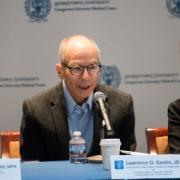
Posted in GUMC Stories
November 21, 2016 – The global health theme of this year’s Ninth Annual Georgetown University Medical Center Convocation presented a valuable opportunity to bring together faculty from around Georgetown University to examine how the university can make an impact on health at a global scale and to ask what our responsibilities and priorities should be.
Featured panelist Roger I. Glass, MD, PhD, director of the Fogarty International Center and associate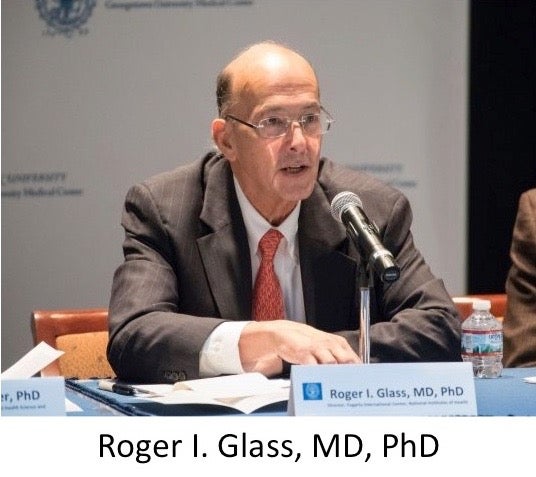 director for international research at the National Institutes of Health and recipient of GUMC’s Cura Personalis Award, spoke about the interdisciplinary nature of global health at “Building Global Health Capacity at Georgetown: Responsibilities and Priorities.” The November 17 colloquium in the Research Building Auditorium brought together experts from the medical center, as well as Georgetown University’s Law Center, Edmund A. Walsh School of Foreign Service and McCourt School of Public Policy.
director for international research at the National Institutes of Health and recipient of GUMC’s Cura Personalis Award, spoke about the interdisciplinary nature of global health at “Building Global Health Capacity at Georgetown: Responsibilities and Priorities.” The November 17 colloquium in the Research Building Auditorium brought together experts from the medical center, as well as Georgetown University’s Law Center, Edmund A. Walsh School of Foreign Service and McCourt School of Public Policy.
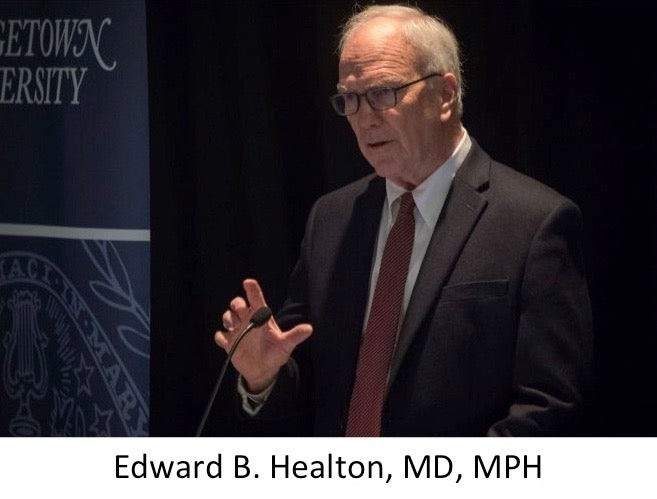 The interdisciplinary nature of global health will be reflected in a new Georgetown University global health initiative expected to launch this January, said Edward B. Healton, MD, MPH, executive vice president for health sciences and executive dean of the School of Medicine. Healton and Tom Banchoff, PhD, Georgetown University vice president for global engagement, will lead the initiative, which was announced by Georgetown University President John DeGioia, PhD, during the afternoon’s convocation ceremony.
The interdisciplinary nature of global health will be reflected in a new Georgetown University global health initiative expected to launch this January, said Edward B. Healton, MD, MPH, executive vice president for health sciences and executive dean of the School of Medicine. Healton and Tom Banchoff, PhD, Georgetown University vice president for global engagement, will lead the initiative, which was announced by Georgetown University President John DeGioia, PhD, during the afternoon’s convocation ceremony.
“This initiative will be a university-wide endeavor that will focus on highlighting, supporting and facilitating interdisciplinary collaboration among the many teaching, research and country-based outreach programs across our schools, departments and campuses that are part of the fabric of our global health community,” Healton said.
Panelists with Interdisciplinary Experience
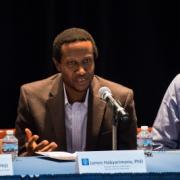 The colloquium panelists represented a diverse range of fields, reflecting the interdisciplinary nature of global health. “My motivation for studying health was I grew up in an environment that suffered largely from a lot of disease burden,” said James Habyarimana, PhD, associate professor in public policy at Georgetown University’s McCourt School of Public Policy. “Even though I became an economist, I was very interested in understanding the costs imposed by illness and disease in these environments.”
The colloquium panelists represented a diverse range of fields, reflecting the interdisciplinary nature of global health. “My motivation for studying health was I grew up in an environment that suffered largely from a lot of disease burden,” said James Habyarimana, PhD, associate professor in public policy at Georgetown University’s McCourt School of Public Policy. “Even though I became an economist, I was very interested in understanding the costs imposed by illness and disease in these environments.”
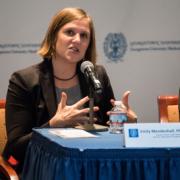 As a medical anthropologist, Emily Mendenhall, PhD, assistant professor in the Science, Technology and International Affairs program at Georgetown’s School of Foreign Service, explained that anthropology has made significant contributions to the field of global health. “We are looking from the ground up and trying to speak about people’s experiences and understanding about how policy interventions can be most effective by understanding human experiences,” she said.
As a medical anthropologist, Emily Mendenhall, PhD, assistant professor in the Science, Technology and International Affairs program at Georgetown’s School of Foreign Service, explained that anthropology has made significant contributions to the field of global health. “We are looking from the ground up and trying to speak about people’s experiences and understanding about how policy interventions can be most effective by understanding human experiences,” she said.
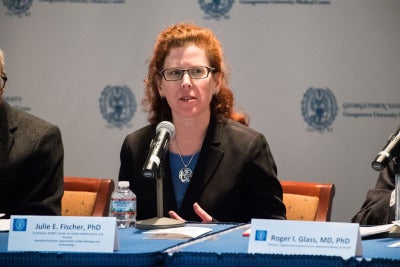 Having the ability to work across disciplines is imperative for those interested in global health careers, said Julie E. Fischer, PhD, co-director of the GUMC’s Center for Global Health Science and Security and associate research professor in the department of microbiology and immunology. “I trained at the bench in viral pathogenesis, but I had to learn how health financing works to understand the cost of building laboratory diagnostic capacity that is sustainable and appropriate to context,” Fischer said. “We have a responsibility as individuals to become more interdisciplinary.”
Having the ability to work across disciplines is imperative for those interested in global health careers, said Julie E. Fischer, PhD, co-director of the GUMC’s Center for Global Health Science and Security and associate research professor in the department of microbiology and immunology. “I trained at the bench in viral pathogenesis, but I had to learn how health financing works to understand the cost of building laboratory diagnostic capacity that is sustainable and appropriate to context,” Fischer said. “We have a responsibility as individuals to become more interdisciplinary.”
Preparing Students for Careers in Global Health
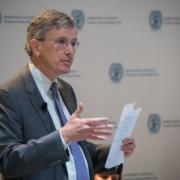 In addition to developing the ability to work across disciplines, the moderator of the colloquium, John T. Monahan, JD, senior advisor for global health and engagement for Georgetown University President John DeGioia, encouraged the audience to think about the professional skills needed to work in global health and how Georgetown can help develop those skills.
In addition to developing the ability to work across disciplines, the moderator of the colloquium, John T. Monahan, JD, senior advisor for global health and engagement for Georgetown University President John DeGioia, encouraged the audience to think about the professional skills needed to work in global health and how Georgetown can help develop those skills.

Those pursuing careers in global health should have the ability to work with a range of stakeholders, said LawrenceO. Gostin, JD, faculty director at the O’Neill Institute for National and Global Health Law at Georgetown University Law Center. “You build change through bottom-up social mobilization working closely with civil society partners and communities is critically important,” he said. “It’s not just the health sector.”
Working with different stakeholders will enable future global health professionals to build partnerships, something that a university like Georgetown is uniquely positioned to do, Fischer said. Building long term partnerships that endure beyond a single project or crisis will establish trust and help the partners work together in a way that’s proactive rather than reactive.
Global Health is Local Health
Those who want to work in global health should also recognize that the challenges that affect populations abroad resonate domestically as well, said Jesse L. Goodman, MD, MPH, professor of medicine and director of GUMC’s Center on Medical Product Access, Safety and Stewardship (COMPASS). “A lot of the problems that we deal with in this country and that people deal with around the world are related and the skill sets are related,” Goodman said. “I don’t think we want to pay attention to the rest of the world without paying attention to our own world.”
Glass agreed, explaining that several current issues in global health are also concerns in our own country. “Life expectancy around the world has gone up,” Glass said. “Even in China, it’s 75 years. In India, it’s approaching 70. So we’re all having the problems of aging. We all have problems of behavior – how do we change behavior? We have problems of obesity. We have problems that we all share. And cancer and mental health.”
“I think the globalization of health and global health is an idea whose time has come,” Glass said. “It’s an important theme and initiative and it represents idealism and the future.”
Kat Zambon
GUMC Communications
